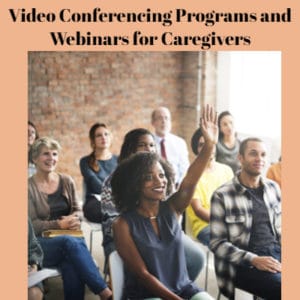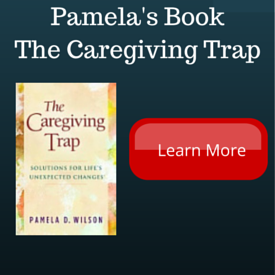Employee Wellness Programs for Caregivers
Employee wellness programs for caregivers by caregiving expert, Pamela D Wilson, can be uniquely designed and delivered through high-quality video conferencing programs and webinars, podcasts, keynotes, and online education. Many employers realize that they have working caregiver problems. Uncertainty exists how to effectively respond to employee caregivers experiencing issues that cross over into personal and family lives—and negatively affect workplace productivity and relationships.
Advances in technology and state of the art video conferencing and interactive webinars bring live or recorded caregiving programs into the workplace. While live keynote sessions are available on location, the convenience of video conferences and webinars of television broadcast quality to company locations worldwide may be preferred. Video conferences and webinar programs may be licensed for use on company intranets. Online caregiving programs offer additional support.
Making Employee Programs Relevant
The Challenges of Being A Working Caregiver
Employees who are caregivers may be uncomfortable talking to supervisors for fear of family caregiver workplace discrimination. Employee caregivers come in late, leave early, and take time off to care for aging loved ones. Work productivity drops when distracted employees begin and end the day caregiving for elderly parents.
The Bureau of Labor Standards confirms that family caregivers spend 3 hours a day, on average, caring for or coordinating care. Employee wellness programs do not address caregiving concerns or health literacy education specific to caring for aging loved ones that benefits working caregivers.
Valuable employee caregivers leave the workplace to care for elderly parents, not realizing the challenges of re-entering the workforce and attempting to replace lost income. Working caregivers experience physical and emotional health declines from the stress associated with caring roles and responsibilities. Managing the care of an elderly parent and interacting with the healthcare system takes specialized knowledge and skills.
The aging demographics in the United States confirm that caring for aging parents is a growing concern. Family caregivers and the workplace lack proactive plans to achieve a work, life, caregiving balance. Video conferencing technology, webinars, and online support provide practical solutions and caregiving programs for working caregivers.
Do Workplace Employee Wellness Programs Work?
Human resource departments evaluate the success of employee wellness programs. According to a Harvard Medical School report, the results of workplace employee wellness programs are mixed. For years the healthcare system and doctors have attempted to educate consumers and working employees about health and wellness to decrease healthcare costs.
Chronic disease statistics are well-publicized. Lifestyle risks associated with chronic disease are smoking, poor nutrition, a lack of exercise, and excessive alcohol use.
- According to the Centers for Disease Control, 60% of adults in the United States have a chronic disease, 40% of adults in the U. S. have two or more chronic diseases
- The Partnership to Fight Chronic Disease, confirms that adults with chronic conditions are the most frequent users of health care in the U.S. accounting for 81% of all hospital admissions, 91% of all prescriptions filled, and 76% of all physician visits. Over 1.1 million lives could be saved each year through better prevention and treatment of chronic disease.
Why then is there low participation in employee wellness programs and a small percentage of adults who willingly choose to embrace healthy lifestyles? Motivation is lacking. How can health and wellness programs become relevant?
Good Health Provides a Sense of False Security
Preventative actions are lacking, and health literacy is low because the consequences of poor health habits may not present themselves until years into the future. The health habits of today may not manifest for ten or twenty years. The diagnosis of chronic diseases rises rapidly between the ages of 30 to 60, according to a Gallup Poll. Research confirms that signs of dementia are present ten to twenty years before a diagnosis.
Health prevention is not a significant part of the primary or secondary school curriculum. Investing in health prevention education could teach children positive habits that remain for a lifetime.
Health literacy, which is the ability of individuals to obtain, interpret, and understand health information, is essential to succeed in managing the care of elderly family members. A combination of programs supporting awareness, education, feedback, and ongoing support have proven to be successful in supporting family caregivers.
When individuals lack health literacy, skills are learned on a trial and error basis result in high levels of stress and frustration. Employee caregivers juggle work, life, and commit twenty or more hours a week to care for elderly parents. Being a caregiver is not an isolated event. Caregiving is a significant life transition.
The effects of being a working caregiver affect all areas of life. Until one has a health diagnosis or becomes a caregiver, it is difficult, if not impossible, to be empathetic to co-workers or friends living this day to day journey that increases in time and financial severity.
Employee caregivers are shocked to discover that elderly parents are financially unprepared to pay for costs of care. Many working caregivers contribute financially to pay for the care costs of elderly parents.
Motivation In Action
Consumers take good health for granted until poor health becomes a day-to-day reality. Upon the diagnosis of a chronic disease like high blood pressure, the long term consequences of the diagnosis are rarely presented by physicians. Twenty percent of Americans with diabetes are undiagnosed and oblivious to the long term effects of the disease that include stroke, heart disease, kidney disease, vision problems, and dementia.
The protection motivation theory links to the idea of making health care changes. The theory explains how individuals cope with or make decisions in times of harmful or stressful events in life. A severe health diagnosis may be stressful for a working employee. Becoming an unexpected caregiver for an elderly parent or a spouse may be another stressful event.
Making caregiving programs and education available through corporate human resource programs can address unexpected employee caregiver situations. Access to video conferencing technology, educational webinars, and live online support combine to create a plan to help working caregivers be proactive and identify issues before they occur. Offering employee caregiving programs accessible on a company intranet makes caregiver support one mouse click away.
Caregiving Programs Paired With Employee Wellness Programs Increase Participation
A significant change in health, watching a loved one suffer because of poor health, and the experience of death can be motivators. Individuals afraid of developing health-related problems or having uncontrollable healthcare expenses as the result of an illness may be more motivated to act.
Research by Harvard Business School, T.Rowe Price, and Merrill Lynch confirms the effects of caring for elderly parents on the work-life, health, and financial well-being of working caregivers. Employee caregivers are faced with the potential of work interruptions and derailed or postponed career progress. Working women are more likely to experience mid-life health disabilities. Caregiving responsibilities strain marital and family relationships.
Working caregivers for elderly parents who witness health issues and financial shortfalls are more proactive in talking about planning for care within families. Still, few families recognize the plight of a surviving spouse, or a surviving parent when all of the family money is devoted to the first spouse or parent who needs care. Financial planning is a gap for many working women.
Video Conferencing Technology Brings Caregiving Programs to Corporations
In addition to video conference technology and webinars, deep-dive online caregiving course modules provide education and access to direct 1:1 support. Dedicated podcasts in response to employee caregiver surveys and polls may also be developed.
The success of employee wellness programs depends on a variety of factors—success results from corporations that provide access to unique programs. In addition, offering key working caregiver employees the opportunity to receive additional education and support boosts learning and problem-solving to the next level.
Caregiving programs prepare employees to respond to unexpected caregiving situations. Caregivers report that they feel unprepared to manage daily care, medical tasks, and may be intimidated by working with healthcare providers. Family relationships become challenging when elderly parents refuse care or disagreements with siblings occur.
Support and education reduce stress and the physical and emotional burdens of caring for elderly loved ones. In return, the workplace benefits from employee presenteeism, dedication, retention, and loyalty.
Caregivers who gain skills from employee wellness caregiving programs transfer learned abilities into the workplace. Sharing experiences about managing health and care situations creates leadership opportunities to inspire other working caregivers who may be struggling and hesitant to ask for help or support. Employee ambassadors can spread knowledge and increase participation in employee wellness programs and caregiving programs.
Pamela D. Wilson has successfully helped caregivers and aging adults solve caregiving challenges for more than twenty years. Read testimonials about Pamela’s work and educational events here.
Request information about uniquely designed video conferences, webinars, and caregiving programs. Contact Pamela D. Wilson by telephone 303-810-1816 or complete a contact form.
©2020 Pamela D. Wilson All Rights Reserved


